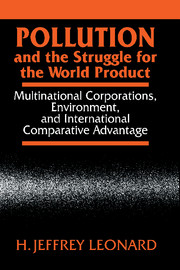 Pollution and the Struggle for the World Product
Pollution and the Struggle for the World Product Book contents
- Frontmatter
- Contents
- List of tables
- Preface
- Introduction
- 1 The dynamics of international trade and industrial location
- 2 Industrial-development strategy and the role of multinational corporations
- 3 Pollution and comparative advantage in industrial production
- 4 Environmental regulations and the industrial-flight hypothesis
- 5 Pollution and industrial strategy in four rapidly industrializing countries
- 6 Bargaining for the right to pollute
- 7 The politics of pollution and multinational corporations in rapidly industrializing countries
- 8 Theoretical implications and policy recommendations
- Index
4 - Environmental regulations and the industrial-flight hypothesis
Published online by Cambridge University Press: 05 January 2012
- Frontmatter
- Contents
- List of tables
- Preface
- Introduction
- 1 The dynamics of international trade and industrial location
- 2 Industrial-development strategy and the role of multinational corporations
- 3 Pollution and comparative advantage in industrial production
- 4 Environmental regulations and the industrial-flight hypothesis
- 5 Pollution and industrial strategy in four rapidly industrializing countries
- 6 Bargaining for the right to pollute
- 7 The politics of pollution and multinational corporations in rapidly industrializing countries
- 8 Theoretical implications and policy recommendations
- Index
Summary
It is difficult from a methodological standpoint to assess whether environmental factors actually have, in the aggregate, induced U.S. manufacturing firms to select more foreign sites for branch plants and have increased the rate of industrialization in countries whose environmental factor endowment is still abundant. The logic of comparative advantage says that if all other things are equal and if environmental regulations significantly affect industry cost calculations, divergent national standards will promote a reshuffling of international industrial-location patterns. But pollution-control costs and other environmental concerns affecting industries cannot be examined in a vacuum. A number of factors make up total costs of production, and costs in turn may be only one of a number of tangible and intangible factors that determine where a company sets up productive facilities.
Consequently, this chapter seeks to establish some recent trends in foreign investment by U.S. industries that might coincide with those to be expected following the introduction of differential national environmental regulations in a Heckscher-Ohlin world. After outlining some of the factors that make it difficult to single out the effects of environmental regulations on comparative advantage in the real world, we shall employ a variety of methods to ascertain whether industries with high pollution-control costs in the United States have recently increased investments in countries with low environmental standards.
- Type
- Chapter
- Information
- Pollution and the Struggle for the World ProductMultinational Corporations, Environment, and International Comparative Advantage, pp. 83 - 116Publisher: Cambridge University PressPrint publication year: 1988


